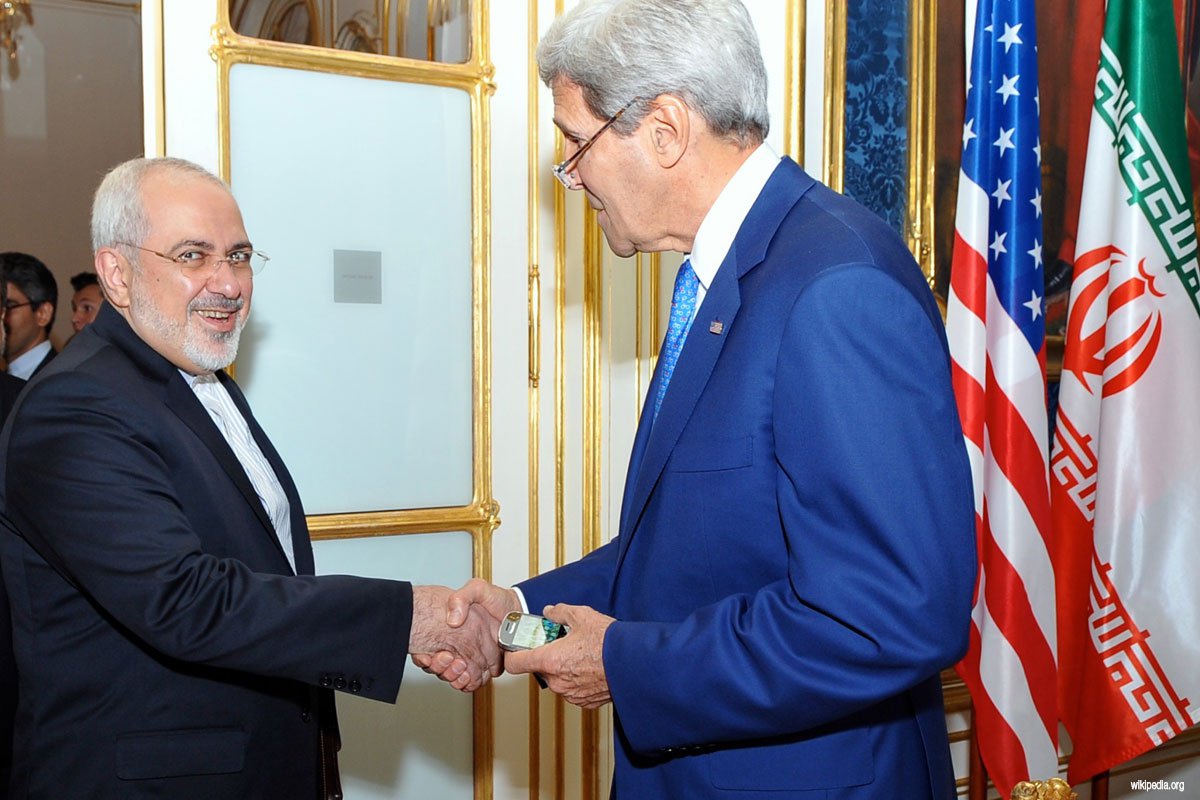
DISCLAIMER: all opinions in this column reflect view of the autor(s), not of Vocal Europe
by Naveed Ahmad
Tehran seems in festive mood over the likely nuclear deal. US Secretary of State John Kerry and his Iranian counterpart Javad Zarif have been holding unprecedented direct talks to find a solution for the nuclear issue. The final document should emerge in June. Realizing that US President Obama is keen to resolve the issue, his Iranian counterpart is hardening the position to earn a better bargain.
The days of high- pitch rhetoric seem over, at least for a while…
Though the Persians want the immediate end of the sanctions, a rapprochement to the west has not convinced yet. Whenever the sanctions are lifted, Iran will receive relief worth $7 billion with waiver of economic sanctions immediately or after a certain period of time. Tehran may get a potential benefit worth $20 billion from “unfrozen assets, recouped petrochemical and auto sales and an array of illicit trade,” says a report by the Foundation for Defense of Democracies. Suspension of curbs on gold and precious metals, auto sector and petrochemical exports, can generate some $1.5 billion in revenue for the country. With financial restrictions against most Iranian banks staying in place, Iran’s dependence on metals like gold as a hedge against a balance-of-payments crisis will increase. Iran won’t have to spend $2 billion each month to control Rial’s price in the open market.
The new arrangement will allow Iran to sell petroleum to China, India, Japan, South Korea, Turkey and Taiwan against purchase of their local goods instead of receiving cash payments.
Though the IAEA will stamp the West’s eagerly awaited nuclear deal with Iran, the fact remains that it will continue to maintain enrichment facilities under a mountain, safe from missile or bomb attacks by its foes. Natanz, a city in the district of Ispahan, besides thousands of enriched centrifuges, provides Tehran with more than enough low enriched uranium to make a bomb. Eagerness to undo the sanctions to resume business with a rich and sizeable country may not allow sane leader to examine its pitfalls amid such high stakes from an NPT signatory.
For the world powers as well as Iran, there is a reason to celebrate prospects of a nuclear deal. Before a final agreement is reached, politicians and business leaders around the world are lining up to see President Rouhani’s aides to capture the oil-rich nation’s market.
Iran is anything but tamed after prolonged isolation from the global economic system. Over the past few years, its support for non-state actors within the larger Middle East has increased significantly. The theocratic state has not only backed Hezbollah with arms and money but also financed Syria’s Bashar Al-Assad to sustain his government amid growing opposition against his policies. Bahrain’s opposition often turned violent on the behest of Iranian regime. More recently, Houthis of Yemen took daredevil steps and forced their way into the presidential palace. More of this is likely to happen at a faster pace and sooner.
For its immediate neighbors – Pakistan, Afghanistan, Azerbaijan and Turkey – there’s little relief. Pakistan and Turkey are dependent on Iranian gas supplies. Ankara is buying Iranian gas at the most exuberant rates while Islamabad is already negotiating for affordable price. Both nations may have a smaller Shia population but are surely good and influential Iranian lobbies. While the Turkish media often report of increasing Iranian influence in the region, Pakistan shocked the world when its parliament unanimously rejected call to militarily support Saudi-led campaign in Yemen. The parliamentary resolution did not differentiate between non-state actors and the legitimate Yemeni government.
It may be the notorious corruption scandal in Turkey involving money laundering worth billions of dollars or mysterious support for Iran in Pakistan, however that may be, the Persian are neatly at work. As much as Erdogan detests Syria’s Assad, he can’t turn his back to friends of the so-called Islamic republic. On the other hand, Nawaz may have been rescued by Saudi Arabia in the worst of times vis-à-vis General Pervez Musharraf, he can’t please his heart and friends-in-need neither.
Similarly, the Afghan president commits support for Saudi Arabia in Yemen conflict, the country’s chief executive, Abdullah Abdullah, wastes no time issuing contradictory statement. While armed clashes between Iranian and Azerbaijani border guards have become more frequent over the last three years, the bilateral trade turnover has also shrunk from 539 to 263 million dollars. Iran has been maintaining extraordinarily close ties with Armenia while backing its stance not only on World War I massacres at the hands of Ottoman troops but also on Nagorno-Karabakh issue.
Except Iraq, the Shia population in Iran’s neighborhood is marginal in demographic terms. However, its involvement in political parties, bureaucracy, businesses, media and banking sector dwarfs influence of key regional and international powers. Many Sunni leaders with anti-America sentiment tend to support Iran.
With the likely nuclear deal and undoing of sanctions, Iran will enjoy a freehand to meddle in internal affairs of its immediate neighbors and the Middle East alike. More financial and political support for its proxies and sympathizers will make up for a direct military intervention, a lesson Saudi Arabia and Turkey should have learnt so far. The Middle East stretching all the way to Pakistan and Afghanistan is set to embroil in a bitter sectarian conflict, thanks to Iran’s desire to export its revolution.
Washington’s excessive optimism with Tehran nuclear talks will become its dilemma. The Arab leader surely will shed light on the pitfalls of such a deal in Camp David where Obama may not like to bid for President Rouhani.
edited by Isabelle Panasi



